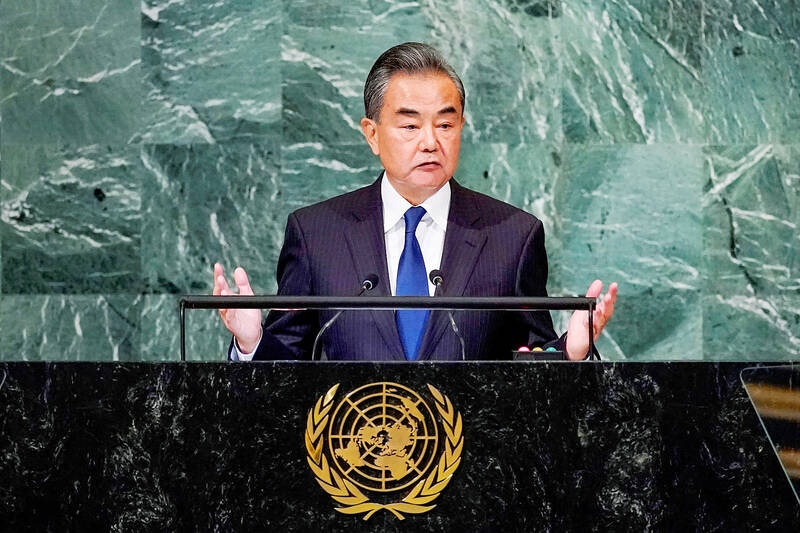Taiwan yesterday criticized Chinese Minister of Foreign Affairs Wang Yi (王毅) for “intentionally misinterpreting” a 1971 UN resolution to misrepresent Taiwan’s status to the global community.
In his address on Saturday to the UN General Assembly, Wang cited Resolution 2758 as a basis for Beijing’s claim that Taiwan is part of China.
He said that Beijing considers Taiwan an “inseparable part of China’s territory since ancient times.”

Photo: Reuters
“Only when China is completely reunified can there be enduring peace across the Taiwan Strait... Any move to obstruct China’s reunification is bound to be crushed by the wheels of history,” Wang said.
General Assembly Resolution 2758 ended the concept of “two Chinas” or “one China and one Taiwan,” he said.
“The ‘one China’ principle has become the basic norm in international relations and a consensus in the international community,” he said. “When entering into diplomatic relations with China, 181 countries all recognized and have accepted that there is one China in the world and Taiwan is part of China.”
In Taipei, the Ministry of Foreign Affairs said in a statement that the resolution transferred China’s seat in the UN from representatives of former president Chiang Kai-shek’s (蔣介石) government to the People’s Republic of China (PRC) without mention of Taiwan.
The resolution did not grant Beijing the right to represent the people or territory of Taiwan in the UN, nor did it say that Taiwan is part of the PRC, it added.
Beijing has been purposely and continually making a “twisted and incorrect political interpretation” of historical documents, it said.
Linking the resolution with Beijing’s “one China” principle isabsurd, it said, adding that the so-called principle does not represent international consensus.
China is resorting to every conceivable means to cut off Taiwan’s international participation and obstruct Taiwan’s opportunities to contribute to the international community, it said.
The Mainland Affairs Council also voiced protest against Wang’s statement, saying that Taiwan “has never belonged to the PRC for one day from the viewpoints of historical fact, international law and reality.”
“Taiwan’s future will be decided by the 23 million Taiwanese people,” it said, adding that the nation would never accept “any political premise or the final status of people across the Taiwan Strait unilaterally decided by Beijing.”
Adopted by the UN General Assembly on Oct. 25, 1971, Resolution 2758 recognized the representatives of the PRC government “as the only legitimate representatives of China to the United Nations.”
The wording reads: “[The UN decides] to expel forthwith the representatives of Chiang Kai-shek from the place which they unlawfully occupy at the UN and in all the organizations related to it.”
Since then, the Republic of China has not been a member of the UN, and efforts to participate in UN-affiliated organizations have been repeatedly thwarted by Beijing.
SEE SAINT ON PAGE 3

US President Donald Trump yesterday announced sweeping "reciprocal tariffs" on US trading partners, including a 32 percent tax on goods from Taiwan that is set to take effect on Wednesday. At a Rose Garden event, Trump declared a 10 percent baseline tax on imports from all countries, with the White House saying it would take effect on Saturday. Countries with larger trade surpluses with the US would face higher duties beginning on Wednesday, including Taiwan (32 percent), China (34 percent), Japan (24 percent), South Korea (25 percent), Vietnam (46 percent) and Thailand (36 percent). Canada and Mexico, the two largest US trading

ACTION PLAN: Taiwan would expand procurement from the US and encourage more companies to invest in the US to deepen bilateral cooperation, Lai said The government would not impose reciprocal tariffs in retaliation against US levies, President William Lai (賴清德) said yesterday, as he announced five strategies to address the issue, including pledging to increase Taiwanese companies’ investments in the US. Lai has in the past few days met with administrative and national security officials, as well as representatives from various industries, to explore countermeasures after US President Donald Trump on Wednesday last week announced a 32 percent duty on Taiwanese imports. In a video released yesterday evening, Lai said that Taiwan would not retaliate against the US with higher tariffs and Taiwanese companies’ commitments to

‘SPECIAL CHANNEL’: Taipei’s most important tasks are to stabilize industries affected by Trump’s trade tariffs and keep negotiations with Washington open, a source said National Security Council Secretary-General Joseph Wu (吳釗燮) arrived in the US for talks with US President Donald Trump’s administration, a source familiar with the matter said on Friday. Wu was leading a delegation for a meeting known as the “special channel,” the Financial Times reported earlier. It marked Trump’s first use of the channel since returning to the White House on Jan. 20. Citing a source familiar with the matter, the Financial Times reported that Minister of Foreign Affairs Lin Chia-lung (林佳龍) was also a part of the delegation. The visit came days after China concluded war games around Taiwan and amid Trump’s

CHIP EXCEPTION: An official said that an exception for Taiwanese semiconductors would have a limited effect, as most are packaged in third nations before being sold The Executive Yuan yesterday decried US President Donald Trump’s 32 percent tariff on Taiwanese goods announced hours earlier as “unfair,” saying it would lodge a representation with Washington. The Cabinet in a statement described the pledged US tariffs, expected to take effect on Wednesday next week, as “deeply unreasonable” and “highly regrettable.” Cabinet spokeswoman Michelle Lee (李慧芝) said that the government would “lodge a solemn representation” with the US Trade Representative and continue negotiating with Washington to “ensure the interests of our nation and industries.” Trump at a news conference in Washington on Wednesday announced a 10 percent baseline tariff on most goods